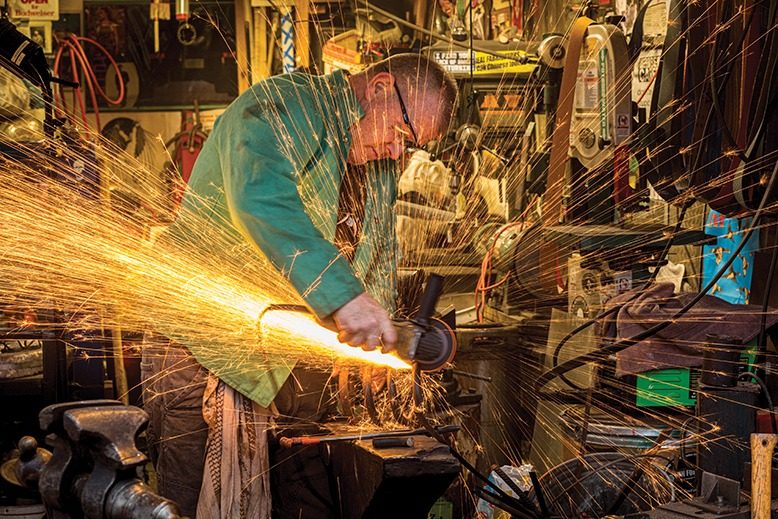
When blacksmith Billy Barrett swings his hammer, sparks fly. On the anvil in his workshop in Byram, Barrett transforms a piece of steel into a knife—but only after five or six hours of grinding, drawing out edges, tapering the handle, heat treating, tempering and polishing.
Knives are Barrett’s specialty. His waitlist of six months includes chefs’ knives, decorative knives, tactical knives for Marines, and knives for outdoor use. He makes simple knives of perfectly polished steel. More elaborate creations derive from recycled railroad spikes or Brooklyn Bridge cable. One Barrett design has a barbwire-wrapped handle dipped in resin.
Barrett, 50, became enamored with blacksmithing after watching an artisan at Colonial Williamsburg as a young boy. He began smithing full-time in his early 30s and is currently practicing to become a journeyman. For the journeyman’s test, he must hand forge six knives, all capable of shaving the hair on an arm, slicing through a 1-inch, free-hanging rope and cutting through a two-by-four.
[RELATED: This Sparta Artist Built a Stained-Glass Cabin]
In a normal year, Barrett would be busy April through October doing demonstrations at festivals and at Peters Valley School of Craft in Layton and Historic Speedwell in Morristown. Most of this year’s events were canceled.
“I always lead everyone toward knife making, but I try to teach everyone basic hammer and tool skills so they can make something to take home that day,” Barrett says. “It’s a powerful feeling to hit metal and make it go where you want, and I love watching people experience that.”
Barrett often asks class participants to show up with inexpensive ball-peen hammers, which are easy to manipulate, flatten and point into small axes. For children, he uses double-headed nails to make tiny daggers and swords—straight or curved like a pirate’s cutlass.
Barrett aims to pique the interest of a new generation. “When I’m long gone, I hope they’re still doing this,” he says.



